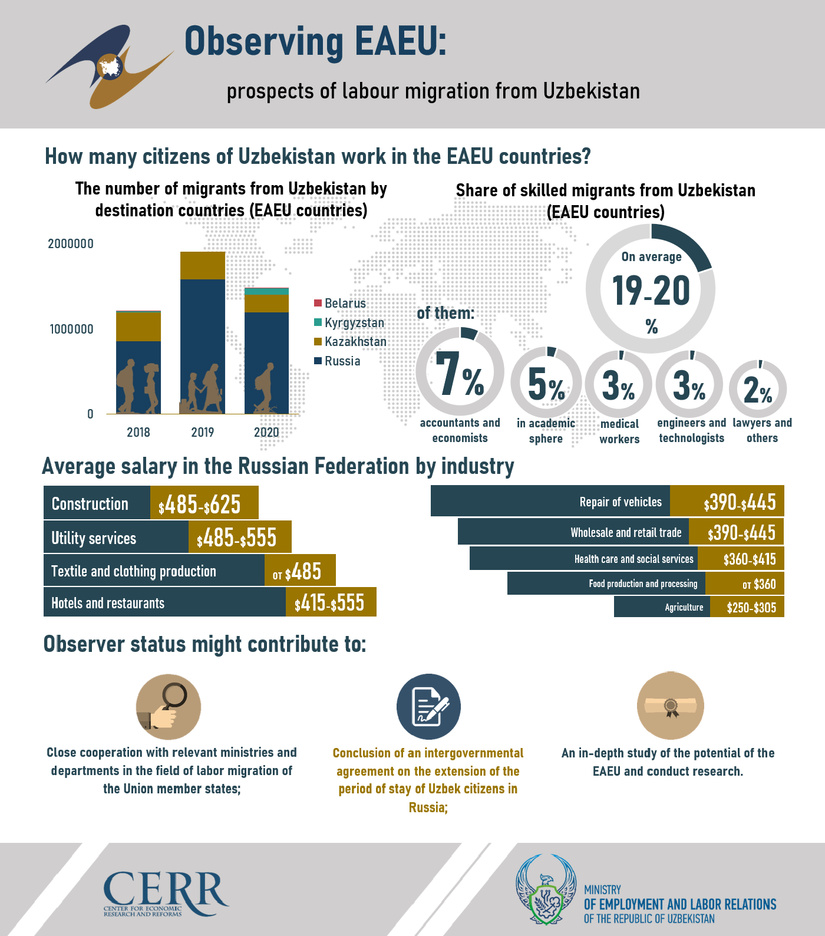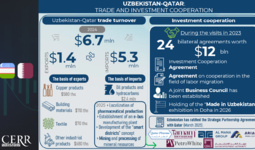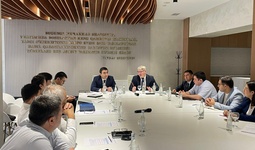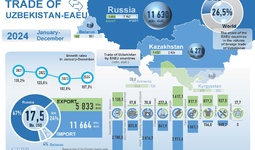The Center for Economic Research and Reforms (CERR) analyzed the perspectives for the development of labor migration in case of Uzbekistan joining the EAEU, Spot writes.
Currently, Uzbekistan having significant demographic growth and has a large labor force. From 2010 to 2020, the population of Uzbekistan grew by 6.4 million, or 23%. According to UNICEF forecasts, the country's population will reach 37 million by 2030.
World Bank data shows that the average unemployment rate in Uzbekistan over the past 10 years was 5-6%. According to the State Statistics Committee of the Republic of Uzbekistan, unemployment in Uzbekistan from 2009 to 2020 increased by 4 percentage points.
In this context, the issue of labor migration is gaining great importance for Uzbekistan. According to the Ministry of Labor, about 1.3 million are currently working in Russia, and about 200 thousand Uzbeks in Kazakhstan.
Thus, labor migration solves the following important aims:
- receipt of income from remittances of citizens of Uzbekistan located abroad (in the range from 4.8 to 6 billion US dollars annually);
For reference: according to the Central Bank of RU, there has been an increase in cross-border transfers in RU in recent years. In particular, in 2017 - 4.8 billion US dollars, in 2018 - 5.1 billion US dollars, in 2019 - 6.0 billion US dollars, in 2020 - - 6.0 billion US dollars. About 85% of the total amount of remittances was received from the EAEU countries.
- reducing pressure on the labor market.
One of the possible solutions to the problem of labor migration for Uzbekistan is to be closer to the EAEU. In case of joining, Uzbek citizens will be able to take advantages and benefits of the common labor market within the union, and if they have an employment contract, they will be able to stay in Russia.
In December, Uzbekistan received observer status in the EAEU. From this perspective, it is of particular interest to consider the current state and prospects of labor migration within the association.
One of the possible solutions to the problem of labor migration for Uzbekistan is seen to be closer to the EAEU. In case of joining, Uzbek citizens will be able to take advantage of the advantages and benefits of the common labor market within the union, and if they have an employment contract, they will be able to stay in Russia indefinitely.
In December, Uzbekistan received observer status in the EAEU. From this perspective, it seems particularly interesting to consider the current status and prospects of labor migration within the framework of the association.
For reference: the Eurasian Economic Union (EAEU) is a regional economic integration, the activities of which are regulated by the Treaty on the Union. The first article of the treaty states that the member states must ensure the free movement of goods, services, capital and labor within the union.
Currently, the EAEU includes five countries: the Republic of Armenia, the Republic of Belarus, the Republic of Kazakhstan, the Kyrgyz Republic and the Russian Federation. The participating countries account for 14% of the world's landmass and have a population of about 185 million.
Labor migration in the territory of the Union
The agreement of the union directs that the member states should jointly pursue a policy in the field of regulation of labor migration within the framework of the association. At the same time, it regulates issues related to the social security of the labor force, medical care, accounting for work experience and, of course, the pension system.
How many labor migrants from Uzbekistan are on the territory of the Union?
For Uzbekistan, the EAEU is an important structure in terms of labor migration processes. This is due to the fact that most of the citizens of Uzbekistan work in the EAEU member states. In particular, according to the Agency for Labor Migration, in 2019 the number of Uzbek citizens working in the Russian Federation amounted to almost 1.6 million, and in Kazakhstan - more than 300 thousand.
According to the Ministry of Internal Affairs of the Russian Federation, in 2017-2019, citizens of Uzbekistan made about 13 million visits to the Russian Federation. Most of them (99 percent) received registration at their place of residence, and about 1 percent received a permit at their place of residence.
More than half of the citizens of Uzbekistan visiting the Russian Federation come first, and more than 80% of them said that they came for work. The citizens of Uzbekistan also visited the Russian Federation for personal (13%), educational (2%), tourism (1%) and other purposes.
In which areas do Uzbek labor migrants work at the territory of the EAEU countries?
According to the Agency for External Labor Migration, citizens of Uzbekistan work in Russia mainly in construction, housing and communal services, transport and logistics, retail and wholesale trade, and public catering. In the Republic of Kazakhstan, most Uzbeks work in construction and agriculture.
According to Rosstat, the average monthly wage of an employee in these industries ranges from $ 300-700. In particular, in the construction sector in the range of 485-625 dollars, in the housing sector in the range of 485-555 dollars, in the textile sector, wages start from 485 dollars.
In Kazakhstan, the average monthly salary in the construction industry starts from $500, in agriculture - from $270. It should be noted that the above figures depend on the geographic location of the migrant, technical skills and many other factors.
The remaining 20% of labor migrants work in industries requiring certain high qualifications. In particular, about 7% work in economics, banking and finance, 5% in education, 3% in medicine, 3% in engineering and technology, and 2% in law and other fields.
What does it mean for Uzbekistan to have EAEU observer status?
Uzbekistan's accession to the EAEU as an observer will not have a direct impact on the rules of the game in the field of labor migration. However, participation in EAEU meetings can provide an opportunity to study the Union legislation in more detail and facilitate research.
In addition, it is likely that the process of negotiations on the extension of the registration period will be stimulated, which is one of the main problems faced by uzbek labor migrants in the Russian Federation.
According to experts of the Ministry of Labor, the observer status will contribute the implementation on a bilateral basis with Russian partners of language training programs for labor migrants.
Also, this will positively affect the solution of the issue of transferring basic services to the territory of the Republic of Uzbekistan for processing the necessary documents to obtain a patent for work in Russia.





















leave a comment